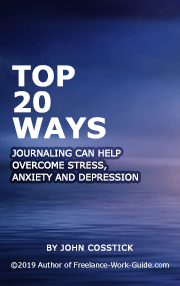Freelancers stress can be a tough problem to overcome. Freelancing can give you a certain amount of freedom in your career, but it also has the potential to cause a lot of stress, and even lead to anxiety and depression.

There are many stressors in the freelancing life, from having to chase up unpaid invoices to struggling to find your next client and rushing to try and meet deadlines.
Freelancing also tends to offer less security than permanent employment. If an economic downturn takes place, the pressure is piled on even more, especially if someone in your family finds themselves without a job. You might even take on a freelancing role after losing your permanent employment.
There are various ways that you might aim to deal with stress as a freelancer. Journaling is one of the methods that you might not have considered, but which can help you to address stress in several ways.
Journaling can be used to help you plan your day, reach your goals, and record your thoughts, feelings and experiences. There are different ways to keep a journal, from simply writing down your thoughts about your day to bullet journaling.
There are no rules, but you might want to find some ideas on techniques you can use, and how they can help you.
1. You Can Create To-Do Lists To Stay On Top Of Workflow

Having many things to do can be one of the stressors in your life as a freelancer. It’s tough to have so much going on, but you’re worried that you can’t afford to turn down any work.
Bullet journaling is one form of keeping a journal that helps you to stay organized and can include making bullet-pointed lists of all the things you have to do. Daily to-do lists help you to stay on top of all your tasks, and you can create lists for the week or even month too.
Making to-do lists can allow you to prioritize all your tasks, listing the most important ones first. You might want to organize them by color-coding them, giving them timeslots or putting your tasks into a timetable to follow throughout the day.
These techniques can be especially useful if you’re short on time, such as when you’re only freelancing on the side. It can help you to break down tasks and prevent everything from becoming too overwhelming.
2. You Can Keep Projects Organized To Help With Longer Timelines And Deadlines

Having a long-term project to work on is often a blessing when you’re freelancing. It means you have work to keep you going for a while, and you might be able to ask for payment at regular intervals or at the end of each stage of the project.
However, a long-term project can also seem overwhelming, and sticking to deadlines can become difficult. It seems like you have so much time at the beginning of the project, but it quickly gets away from you.
Journaling can help you to organize your projects and stick to deadlines. It gives you somewhere to write down the most important information you need to know, which tasks you need to complete and when, and what big deadlines you have coming up.
When you have a journal, it can allow you to put all your thoughts in one place. Make big projects less stressful by breaking them into more manageable pieces. Your journal can be a valuable project management tool.
3. You Can Track Your Productivity To Get More Done

When you only have so many hours in the day and a lot to do, staying on track can be tough. It’s especially hard if you’re working at home, and there are plenty of things to distract you.
Being productive is essential, but it might feel like there’s never enough time to do what you need to do. Journaling can help you to track your productivity so that you’re able to get more done with the time you have and reduce stress by understanding where your time goes.
When you track how long it takes you to do certain tasks and separate your activities into manageable blocks of time, you can find that you can be much more productive.
Keeping track of how productive you are in your journal shows you when you are most productive and might help to highlight the things that are distracting you too.
Tracking the hours you work is also very helpful for charging your clients the correct amount, helping to ease your money worries, and making sure your time doesn’t go to waste.
4. You Can Set Goals To Take Your Freelancing Further

There are always times when freelancing can be a struggle, but you don’t want those times to last forever. Everyone wants to reach a stage in their freelance career when they are receiving regular work, and preferably of the type of work they most enjoy doing.
Plus, you probably have income goals that you want to meet. Journaling can help you to set and track your goals so that you can take your freelancing further and get to where you want to be.
Using whichever journaling techniques you prefer, you can set goals not just for your freelancing business, but also to help you with your self-improvement and self-care. Your goals might include securing a certain number of new clients, which you can then break down into smaller objectives.
But they could also include taking more time for yourself, learning a new skill or using different methods to help you deal with stress.
5. You Can Write Down Your Thoughts To Destress

When you think of journaling, you probably think of writing down your thoughts and feelings. While this isn’t the only thing that you can do with a journal, it is one of the best things that you can do for stress and mental health.
Putting your thoughts to paper is an excellent form of stress release, letting you get out your feelings without having to speak to someone else. Sharing your feelings with others is healthy, but sometimes you want to keep things to yourself, especially when it’s the day-to-day things that cause you stress.
By writing down your thoughts and feelings, you can examine the negative talk that might emerge and encourage yourself to be positive about things too. There are various ways you might write in your journal each day.
You can simply write a free-flowing text of your thoughts, or you could ask yourself questions each day to assess how you’re feeling. It’s up to you how you benefit from keeping your journal.
6. You Can Improve Your Physical Health With Journaling
As well as helping your mental health by journaling, you can boost your physical health. Being physically healthy in turn helps your mental health, and can help you to deal with stress, anxiety and depression.
Keeping a journal has been shown to improve your physical health in several ways, including improving the symptoms of asthma and arthritis.
When you keep a journal, it can make it easier to track various things that affect your health, whether it’s your diet, how much you exercise or the things that might trigger symptoms of a chronic health condition.
Better physical health can help you to deal with stress, anxiety and depression. For example, exercising more, eating better and sleeping better can all improve your mood. They can make the symptoms of anxiety and depression less frequent and more manageable.
Your physical health and mental health and interlinked and, although being physically healthy doesn’t mean you can’t experience mental health symptoms, it can improve your overall health.
7. You Can Solve Problems By Writing Them Down

Journaling can help you to solve problems of all kinds, whether in your work life or personal life. By writing your problems down, you can examine them and come up with solutions.
Whether you’re worrying about a personal problem or you need to try and solve an issue related to work, getting it down on paper can make things a lot clearer. You can reflect on your problems, what’s causing them and how you can make changes to make them easier to deal with.
Writing down your problems could make it easier to find practical solutions, or it could be the first step to changing how you think about something. Many of the things in your life could be simpler to deal with if you considered different ways to approach them.
You can organize your thoughts by jotting down a few bullet points or even using things like flowcharts and diagrams. Tackle your stress by dealing with the problems that affect you day-to-day.
8. You Can Get Off Your Computer To Journal In A Notebook

In this increasingly technological world, we can spend all day sitting at a computer. When you’re not using your computer for work, you might be on your phone or tablet.
You might need to be online for work but being constantly connected isn’t always good if you’re dealing with stress. From being unable to escape clients to the stresses of social media, the internet can feel like it causes more problems than it solves.
You could keep a digital journal if you wanted to, but a notebook can offer you several benefits. Spending some time writing in a notebook or a pad allows you to unplug and leave your computer and smart devices alone for a while.
You can focus on writing by hand, and even add drawings, diagrams and other things to your journal. You can highlight important information, use stickers, paint in your journal, and do anything that you want with it. It’s a great way to relax and take some time out.
9. You Can Understand What’s Causing Your Stress

When you’re stressed or anxious, you don’t always understand why. Sometimes, there might not be an external reason, but the things happening in your life have the potential to make things worse.
When you keep a journal, it could help you to understand the main causes of stress in your life. By writing down the things that you have done each day and your thoughts about events, you can start to identify the things that might be affecting you most.
Perhaps you find yourself more stressed some days but don’t know why. If you keep a journal, you might find a pattern, such as feeling more stressed when you sleep less or when you must deal with a client.
Once you have identified the things that you find stressful and perhaps understood why they make you feel stressed, you can start to consider solutions. It’s difficult to deal with your problems if you’re not exactly sure what they are, but your journal could be the key to unlocking the answers.
10. You Can Journal In A Way That Suits You

The excellent thing about journaling is that you can do it in a way that suits you. There are many different types of journaling and techniques that you can use, which give you different methods to deal with stress.
Some types of journaling include:
- Bullet journals – use bullet-pointed lists and short text, combined with color-coding, art and images
- Gratitude journals – write down the things that you’re grateful for every day
- Dream journals – record your dreams, and perhaps spend some time analysing them
- Project journals – track the progress of a project, whether for work or something personal
There are various other types of journal that you might want to keep. Perhaps you simply want to stick to a traditional diary, when you write down your thoughts and feelings at the end of each day. You don’t necessarily have to do anything complicated or fancy to gain the benefits of keeping a journal.
Journaling offers you a variety of ways to tackle stress, anxiety and depression, and to keep your life in order. You could try experimenting with some different journaling techniques to see what you enjoy, and which methods work for you. You can read more about how journaling can help you by clicking on the icon below:
















